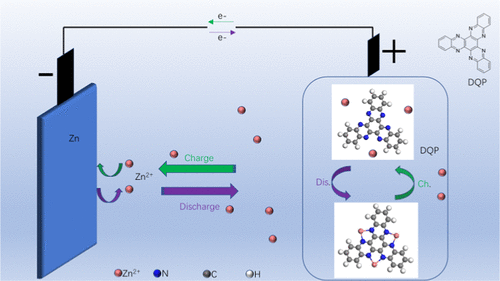当前位置:
X-MOL 学术
›
ACS Appl. Energy Mater.
›
论文详情
Our official English website, www.x-mol.net, welcomes your
feedback! (Note: you will need to create a separate account there.)
Extended π-Conjugated System in Organic Cathode with Active C═N Bonds for Driving Aqueous Zinc-Ion Batteries
ACS Applied Energy Materials ( IF 5.4 ) Pub Date : 2021-01-05 , DOI: 10.1021/acsaem.0c02526 Hong Zhang 1, 2 , Sijun Xie 2 , Ziyi Cao 1, 2 , Dongxiao Xu 1, 2 , Lipeng Wang 1, 2 , Huayi Fang 2, 3 , Jianfeng Shen 1 , Mingxin Ye 1
ACS Applied Energy Materials ( IF 5.4 ) Pub Date : 2021-01-05 , DOI: 10.1021/acsaem.0c02526 Hong Zhang 1, 2 , Sijun Xie 2 , Ziyi Cao 1, 2 , Dongxiao Xu 1, 2 , Lipeng Wang 1, 2 , Huayi Fang 2, 3 , Jianfeng Shen 1 , Mingxin Ye 1
Affiliation

|
Organic compounds have recently been demonstrated to be alternative cathodes to inorganic ones for aqueous zinc-ion batteries (ZIBs), while the limited electrochemical performance greatly restricts their applications, which is partly attributable to their small π-conjugated systems. Here, to extend the π-conjugated system, diquinoxalino[2,3-a:2′,3′-c]phenazine (DQP) was designed and prepared, intriguingly exhibiting an ultrahigh capacity of 413 mA h g–1 at 50 mA g–1 for ZIBs. In addition, the combination of detailed density functional theory calculations and ex situ characterization techniques, such as IR and X-ray photoelectron spectroscopy spectra, clearly reveals the electrochemically active C═N bonds transformation in charging and discharging circulation. Moreover, the results also demonstrate that the extended π-conjugated system with active C═N bonds is associated with enhanced electrochemical stability, conductivity, and reversible capacity. Besides, owing to its excellent insolubility in water, DQP also delivers high capacity retention of 86% after 1000 cycles at 5 A g–1. Thus, this work provides a reasonable strategy for organic cathodes applied in aqueous ZIBs.
中文翻译:

具有活性C═N键的有机阴极扩展π共轭体系,用于驱动水性锌离子电池
最近,有机化合物已被证明是水性锌离子电池(ZIBs)的无机阴极的替代阴极,而有限的电化学性能极大地限制了它们的应用,这部分归因于它们小的π共轭体系。在这里,为了扩展π共轭体系,设计并制备了二喹喔啉[2,3- a:2',3'- c ]吩嗪(DQP),在50 mA g时表现出413 mA hg –1的超高容量–1ZIB。此外,将详细的密度泛函理论计算与非原位表征技术(例如IR和X射线光电子能谱)相结合,清楚地揭示了充放电循环中电化学活性C═N键的转变。此外,结果还表明,具有活性C═N键的扩展π共轭体系与增强的电化学稳定性,电导率和可逆容量有关。此外,由于其在水中的出色不溶性,DQP在5 A g –1的1000次循环后还具有86%的高容量保持率。因此,这项工作为在水性ZIBs中应用有机阴极提供了合理的策略。
更新日期:2021-01-25
中文翻译:

具有活性C═N键的有机阴极扩展π共轭体系,用于驱动水性锌离子电池
最近,有机化合物已被证明是水性锌离子电池(ZIBs)的无机阴极的替代阴极,而有限的电化学性能极大地限制了它们的应用,这部分归因于它们小的π共轭体系。在这里,为了扩展π共轭体系,设计并制备了二喹喔啉[2,3- a:2',3'- c ]吩嗪(DQP),在50 mA g时表现出413 mA hg –1的超高容量–1ZIB。此外,将详细的密度泛函理论计算与非原位表征技术(例如IR和X射线光电子能谱)相结合,清楚地揭示了充放电循环中电化学活性C═N键的转变。此外,结果还表明,具有活性C═N键的扩展π共轭体系与增强的电化学稳定性,电导率和可逆容量有关。此外,由于其在水中的出色不溶性,DQP在5 A g –1的1000次循环后还具有86%的高容量保持率。因此,这项工作为在水性ZIBs中应用有机阴极提供了合理的策略。






























 京公网安备 11010802027423号
京公网安备 11010802027423号